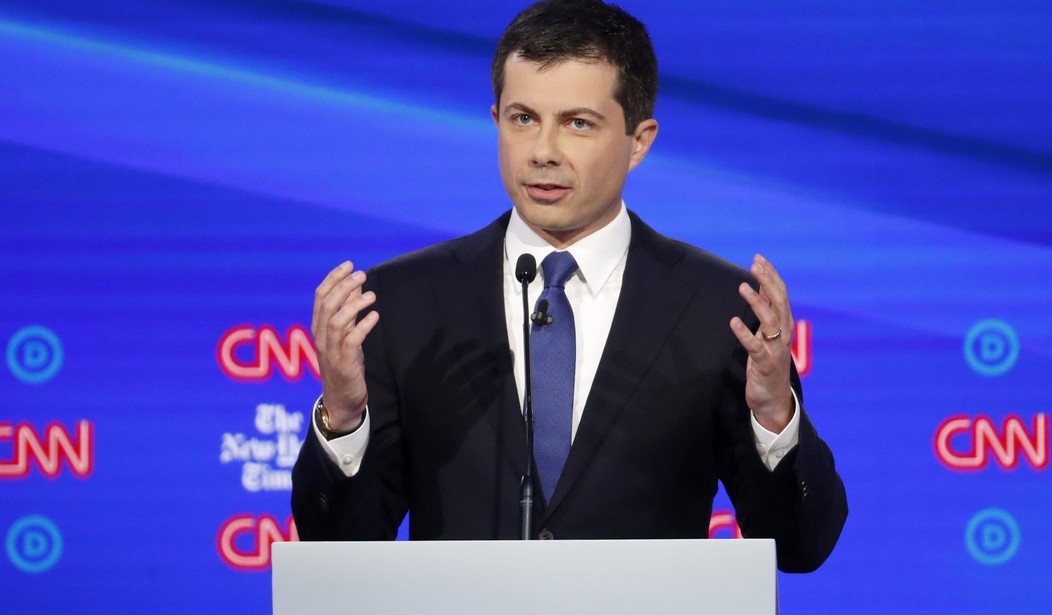In politics, there are certain open secrets everyone knows but few will mention. One you might only hear a very few Democrats say out loud, and even that in a whisper, is the strong dislike between two of their party’s most reliable voting blocs: Blacks and gays. That means that South Bend, Ind., mayor (and totes gay presidential contender, NTTAWWT) Pete Buttigieg has a problem if he’s serious about winning his party’s nomination. And it doesn’t at all help how he and his campaign just embarrassed themselves with a Big Lie — a Big Mistake? — over his support from black voters.
Before we get to that, let’s look at the first part of the Democratic primary map. The big ball gets officially rolling a little less than 12 weeks from right now with the Iowa caucuses. While there are only 41 delegates at stake out of the 1,885 needed to win, Iowa is a good test of a candidate’s grassroots appeal and, more importantly, their ability to organize and execute a campaign strategy. Going back to 1972, when the caucuses were first held, Iowa caucusgoers have picked the Dem nominee in contested primaries six out of nine times. And they’ve picked the nominee in every contested election since 2000. Winning Iowa is kind of a big deal, and Buttigieg is leading there in recent polls. The RealClearPolitics average has Buttigieg up by 2.2 points, and he’s up by nine in the most recent survey, conducted by the Des Moines Register and CNN.
This, however, is where Joe Biden — who scores very well with black voters — might whisper, “But there are hardly any blacks in Iowa.” Biden could say the same thing about New Hampshire, where Buttigieg is mired in fourth place behind (in order) Elizabeth Warren, Biden, and Bernie Sanders. But a strong showing in Iowa on February 3 might give Buttigieg a big boost in gay-friendly New Hampshire a week later on the 11th. From there the voting moves to Nevada, which is another state with a smaller-than-average percentage of black voters.
February 29 isn’t just when South Carolina Democrats will vote in their primary: It’s also the first test of Biden’s black-voter firewall. Biden’s gameplan at this point is to ride out expected losses in Iowa and New Hampshire, then count on union-friendly Nevada and black-heavy South Carolina to confirm his frontrunner status. If Biden can’t score wins in those two states, he’s probably toast.
Enter stage left: Buttigieg’s Big Fake Endorsements.
Near the end of October, Buttigieg announced big endorsements for his racial-healing-or-whatever plan, dubbed the Frederick Douglass Plan for Black America. He describes it as “a comprehensive and intentional dismantling of racist structures and systems,” which includes “reforming broken criminal justice and health systems, strengthening access to credit and injecting capital into the Black community.” It sounds like a lot of empty words and vote-buying to me, but then I’m a cynic. His campaign went on the offensive, touting endorsements from 400 important South Carolinians, with the heavy implication that they were all black. The Washington Post reported last Monday that “Buttigieg persuaded hundreds of prominent black South Carolinians to sign onto the plan even if they are not supporting Buttigieg himself.”
Or did they even go that far?
The left-leaning Intercept took a look late last week, and found Buttigieg’s claims severely wanting. While noting that Buttigieg has “strived mightily to win support among the black community,” Ryan Grim’s headline sums it nicely: “Pete Buttigieg Touted Three Major Supporters of His Douglass Plan for Black America. They Were Alarmed When They Saw It.”
Columbia City Councilwoman Tameika Devine, mentioned by name in Buttigieg’s press release, “told The Intercept that she did not intend her support for the plan to be read as an endorsement for Buttigieg’s candidacy, and believes the campaign was ‘intentionally vague’ about the way it was presented.” Similar complaints were made by two other “endorsements” touted by Buttigieg, state Rep. Ivory Thigpen, and Johnnie Cordero, chair of the state party’s Black Caucus.
Slate’s Ben Mathis-Lilley dug into Buttigieg’s announcement and found stuff even more problematical for progressive Dems. Mathis-Lilley wrote that the “political usefulness of such a document is obvious for Buttigieg, who is polling very poorly with black voters both nationally and in South Carolina,” but “at least 40 percent of the other 400 individuals whose names are listed are white.” He notes that “rather than asking individuals directly to sign their names to the article, it merely gave those whom it considered to have endorsed the Douglass Plan the chance have their names removed.” He concludes, “the Buttigieg campaign and its ‘endorsers’ may not have agreed on whether they were in fact ‘endorsers’ at all.”
Tricksy Hobbitses.
Buttigieg engaged in three nasty little sleights-of-hand. The first was the implication that 400 black South Carolinians had endorsed his plan, when in fact nearly half of those listed were white, and an unknown number perhaps Hispanic or something else. The second was that they had actually endorsed the plan, which many had not. The third was that an endorsement of the Douglass Plan was an endorsement of Buttigieg, which also was not the case.
The real shame of it all is twofold. The first is that blatant trickery like this is almost always caught, resulting in a completely unnecessary self-own. The second is that the Intercept — whether on accident of by design — released its findings just when Buttigieg was surging in those Iowa polls. But it’s a safe bet that race- and sexual orientation-obsessed Dems will be talking about Buttigieg’s tomfoolery instead of his amazing Iowa numbers.
Just desserts, if you ask me. I’ve said from the start that there’s a mean undercurrent to Buttigieg’s holier-than-thou stage persona, and these Douglass Plan endorsement antics confirm it.










